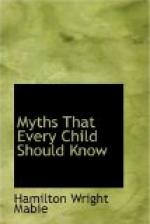CHAPTER PAGE
I. The three golden apples
3
(Hawthorne’s
“Wonder Book”)
II. The pomegranate seeds
27
(Hawthorne’s
“Tanglewood Tales”)
III. The chimaera
65
(Hawthorne’s
“Wonder Book”)
IV. The golden touch
92
(Hawthorne’s
“Wonder Book”)
V. The Gorgon’s head
112
(Hawthorne’s
“Wonder Book”)
VI. The dragon’s teeth
140
(Hawthorne’s
“Tanglewood Tales”)
VII. The miraculous pitcher
174
(Hawthorne’s
“Wonder Book”)
VIII. The paradise of children
107
(Hawthorne’s
“Wonder Book”)
IX. The cyclops
216
(Church’s
“Stories from Homer”)
X. The argonauts
227
(Kingsley’s
“Greek Heroes”)
XI. The giant builder
299
("In Days of Giants”)
XII. How Odin lost his eye
308
("In Days of Giants”)
XIII. The quest of the hammer
316
("In Days of Giants”)
XIV. The apples of idun
330
("Norse Stories”)
XV. The death of Balder
337
("Norse Stories”)
XVI. The star and the lily
348
(Miss Emerson’s
“Indian Myths”)
INTRODUCTION
In many parts of the country when the soil is disturbed arrow heads are found. Now, it is a great many years since arrow heads have been used, and they were never used by the people who own the land in which they appear or by their ancestors. To explain the presence of these roughly cut pieces of stone we must recall the weapons with which the Indians fought when Englishmen, Frenchmen, Dutchmen, and Spaniards first came to this part of the world. There may be no authentic history of Indians in the particular locality in which these old-fashioned weapons come to light, but their presence in the ground is the best kind of evidence that Indians once lived on these fields or were in the habit of hunting over them. In many parts of the country these arrow heads are turned up in great numbers; museums large and small are plentifully supplied with them; and they form part of the record of the men who once lived here, and of their ways of killing game and destroying their enemies. Wherever there are arrow heads there have been Indians.




